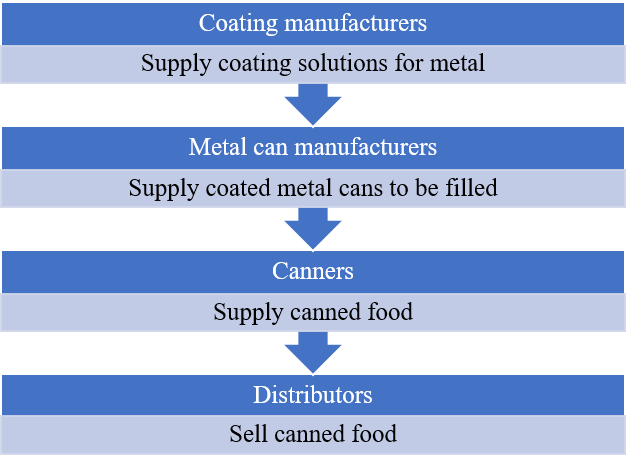Bisphenol A in food containers: almost €20 million in fines

The Autorité de la concurrence has fined three professional canning associations (the FIAC, the ADEPALE and the ANIA) and the can manufacturers’ trade union SNFBM for having implemented a collective strategy intended to prevent manufacturers in the sector from competing on the presence, or absence, of Bisphenol A in food containers (cans, tins, etc.).
11 companies, in their capacity as members of these organisations, have also been fined, with the cumulative amount of the fines reaching almost €20 million.
Background
The Autorité has fined three professional canning associations and a can manufacturers’ trade union for having implemented practices intended to prevent competition on the presence, or absence, of Bisphenol A (BPA) in food containers, in the context of the adoption of the French law of 24 December 2012 banning the use of BPA in all food containers as of 1 January 2015. The cartel was organised during the transitional phase, during which cans with and without BPA were simultaneously placed on the market (a grace period introduced to allow stocks to be used up).
These practices, which together constitute a single, complex and continuous infringement (SCCI), were implemented from 6 October 2010 to 21 July 2015, i.e. over more than four years, and took two forms:
Preventing manufacturers from communicating on the absence of BPA in their food containers:
- the FIAC and then the ADEPALE and the ANIA informed canned food manufacturers of the importance of not competing on the presence, or absence, of BPA in their food containers;
- this collective strategy was extended upstream to can manufacturers, through the actions of the SNFBM;
- efforts were also made to extend this strategy downstream to the mass retail distribution sector, but these were unsuccessful;
- deviations from the cartel were monitored, as several players decided to communicate on the absence of BPA in their products.
Encouraging manufacturers to refuse to supply BPA-free cans before 1 January 2015 and then to refuse to stop selling cans with BPA after this date, despite the demands of the mass retail distribution sector to this effect. The FIAC and the SNFBM are the only two collective organisations implicated in this second practice and, hence, in the SCCI constituted by the two practices together.
11 companies, in their capacity as members of the above-mentioned collective organisations, and whose individual participation in the cartel was deemed to have been proven by the Autorité, have also been fined. For the most part, this individual participation took the form of attending meetings organised by their associations or trade unions, the purpose of which was anticompetitive. These companies are the canning companies Andros, Bonduelle, Charles & Alice, Cofigeo, Conserves France, D’Aucy, General Mills and Unilever, and the can suppliers Ardagh, Crown and Massilly.
The four professional organisations and 11 member companies have been fined a total of €19,553,400.
The Autorité considers the two practices constituting the SCCI to be very serious, as they meant that consumers were unable to choose BPA-free products, at a time when these products were available and when BPA was already considered dangerous to health.
Nevertheless, the Autorité departed from its notice on fines, taking into account the diversity of the entities implicated, in terms of both their economic heft and their role within the sector: on the one hand, the professional organisations sanctioned as directly responsible for the practices in question; on the other, the companies sanctioned as members of these organisations, on account of their individual participation. The Autorité considered that, in this context, applying the notice on fines would have led to disproportionate fines being imposed on the companies.
The Autorité also took into account the specific legal and regulatory framework in which the practices in question took place and the actions of the authorities vis-à-vis the players in the sector as mitigating factors.
The context: the legal ban on the use of BPA in all food containers and the introduction of a transitional period to allow stocks to be used up
Bisphenol A (BPA) is a synthetic chemical used in the manufacture of resins, in particular to protect the inside of metal food cans (including beverage cans), and in metal lids.
France was the first European country to tackle the issue of BPA in contact with food, banning the use of BPA in baby bottles on 1 January 2013 and then in all packaging, containers and utensils intended to come into contact with food as of 1 January 2015.
According to the interpretation of the Directorate General for Competition Policy, Consumer Affairs and Fraud Control (DGCCRF), the French law of 24 December 2012 banning the use of BPA in all food containers as of 1 January 2015 provided that:
- the placing on the French market of metal cans with BPA coating, which had not yet come into contact with food, was banned as of 1 January 2015;
- the placing on the market of food packaged in metal cans coated with BPA coating was banned as of 1 January 2015.
In order to allow stocks to be used up, a specific transitional arrangement was introduced by the DGCCRF. Empty containers with BPA and the food packaged in these containers, already in circulation prior to 1 January 2015, could still be sold after 1 January 2015 until stocks had been used up.

The implementation of a collective non-competition strategy covering the entire value chain
The Autorité found that the Fédération des Industries d’Aliments Conservés (FIAC) organised a cartel intended to encourage manufacturers not to compete on the presence, or absence, of BPA in their cans and to coordinate the communication aimed at consumers on this issue.
The sanctioned practices were part of an overall plan to neutralise the competitive risks arising from the introduction of BPA-free food containers on the market.
The other professional organisations concerned all avoided any competition on this selling point, which is particularly important for consumers, by contributing to at least one of the practices initiated by the FIAC. These organisations are the Association des Entreprises de Produits Alimentaires Elaborés (ADEPALE), the Association Nationale des Industries Alimentaires (ANIA) and the Syndicat National des Fabricants de Boîtes, Emballages et Bouchages Métalliques (SNFBM):
- The FIAC, the ADEPALE, the ANIA and the SNFBM agreed to encourage manufacturers not to compete on the presence, or absence, of BPA in their cans (first strand).
The Autorité found that the parties agreed not to compete on the presence, or absence, of BPA in their cans. In effect, “to avoid arousing distrust on the part of consumers”, an agreement was reached not to use the absence of BPA as a selling point that could, according to the parties, “destabilise the entire value chain”.
The collective strategy for the communication on the absence of BPA was initiated by the professional canning organisations, which then attempted to obtain the support of the entire value chain.
In 2010, the FIAC, at a working group of its members and subsequently at a board meeting, suggested that there should be no competition on BPA. The FIAC and some of its members then promoted this initiative to the other professional organisations implicated. These organisations, representing metal packaging manufacturers and canning companies, agreed not to make BPA a competitive criterion. Between 2010 and 2015, they regularly reminded their members, either at meetings or in bilateral exchanges, of the importance of not competing on the presence, or absence, of BPA.
Furthermore, on several occasions, the parties also tried – unsuccessfully – to persuade the mass retail distribution sector to join this collective strategy, at a time when this sector wanted to indicate “BPA-free” (Sans Bisphénol A) on their private label products.
In parallel with this cartel, the Autorité found that several organisations, in particular the ADEPALE, had set up a procedure for managing communication on the absence of BPA. In addition, certain member companies of the various professional organisations readily reported cases in which operators had infringed the collective communication rule to the various professional organisations. The professional organisations then put pressure on the players concerned. For example, the ANIA spoke to Tetra Pak, Mom, Fleury Michon and retailers including Système U (which experimented with displaying a “BPA-free” label on their products).
- The FIAC and the SNFBM collectively encouraged manufacturers to refuse to supply BPA-free cans before 1 January 2015 and then to refuse to stop selling cans with BPA after this date, despite the demands of the mass retail distribution sector (second strand).
During its investigation, the Autorité found that some of the parties had also colluded to thwart the intention of certain players to anticipate the introduction of the law by offering only BPA-free cans.
On several occasions, several players in the sector, via the FIAC in particular, collectively expressed the view that requests made by certain distributors to be supplied with BPA-free cans before 1 January 2015, the date on which the law came into force, should be refused. Whether at meetings organised within the professional organisations or between the mass retail distribution sector and these same professional organisations, the FIAC and the SNFBM reiterated the importance of not agreeing to the demands of the mass retail distribution sector to be supplied with BPA-free cans, as can be seen, in particular, in the minutes of a technical meeting on 22 January 2014: “Canning companies must not accept demands from distributors for a rapid switch to unintentional Bisphenol A (BPA NI) coatings. The coordinated switchover of the entire sector must be reiterated, the sole aim of which is to be ready by 1 January 2015. This point, which has been raised several times, is particularly important.”
The early introduction of a large number of BPA-free cans before the legal deadline would have made the implementation of the strategy of not using “BPA-free” as a selling point more difficult. Once again, the objective was to prevent any company from gaining a competitive advantage by promoting the absence of BPA in its products.
Furthermore, on several occasions in 2014, certain players in the sector also collectively expressed the view that requests made by certain distributors that all supplies of cans with BPA cease by 1 January 2015, the date on which the law came into force, should be refused.
Anticompetitive practices by object
The Autorité considers that these practices, which concern essential parameters of competition, namely information on the composition of products (first strand) and the quality of products (second strand), are anticompetitive by object, due to their nature, purpose and context.
The justifications put forward by the respondents were not sufficient to exonerate them.
The risk that the sector would be destabilised, as put forward by the respondents, cannot be accepted: a crisis situation, even if proven, does not exonerate practices under competition law. The rules of the French Consumer Code (Code de la consommation) can only be considered as an exemption if there is a constraint on operators, which none were able to demonstrate. The same applies to the role of public authorities, for which it has not been established that they were aware of or encouraged the practices in question.
Total fine of €19,553,400 imposed by the Autorité
Two objections were notified by the Investigation Services:
- the first objection related to a cartel intended to limit communication on the absence of BPA, coordinate marketing and reduce “best before dates” (now called “minimum durability dates”) for products containing BPA;
- the second objection related to a cartel intended to restrict information on BPA substitutes used in materials coming into contact with food.
Only the first objection, whose scope was reduced, was upheld by the Autorité. It considered that the information in the case was not sufficient to establish that there was collusion to accelerate the marketing of BPA-free cans from 2013, the aim of which would have been to avoid having to issue a health warning on the risks posed by BPA and to reduce the best before dates for products containing BPA. Furthermore, it considered that it had not been established that the respondents had collectively decided to limit information on the composition of coatings used in place of coatings with BPA.
With regard to the objection upheld, namely the limitation of communication on products being “BPA-free” and of the marketing of BPA-free cans, the Autorité considered that they constituted a single, complex and continuous infringement (SCCI) from 6 October 2010 to 21 July 2015.
Having examined the evidence in the case, the Fédération du Commerce et de la Distribution (FCD), Carrefour, Leclerc, Les Mousquetaires and Système U were cleared of any wrongdoing, given that there is no proof of their acquiescence in any of the practices constituting the SCCI organised by the FIAC with the support of the SNFBM.
The Autorité also considered that there was no evidence in the case to establish that the Centre Technique de la Conservation des Produits Agricoles (CTCPA), a public interest organisation that carries out public service missions and whose role includes conducting collective research, had played a “facilitating” role in the sanctioned practices.
With regard to the companies and associations implicated as members of professional organisations, the practices were found to be time-barred in many cases, as no participation had been demonstrated after 28 December 2013. The Autorité therefore cleared: Alliance 7, Ball, Bel, Boissons rafraîchissantes de France, Brasseurs de France, Chancerelle, Danone, the CITPPM, Carlsberg, Coca-Cola, CCEP, the FEDALIM, the FNCL, Fleury Michon, Gendreau, Mom, Nestlé, PepsiCo, Suntory, Unijus and the UPPIA.
In addition, on account of the diversity of the entities implicated, the Autorité departed from its 2021 notice on fines.
The Autorité considered that the two strands of the SCCI, taken together and individually, constituted a particularly serious practice, insofar as they meant that consumers were unable to choose BPA-free products, at a time when these products were available and when BPA was already considered dangerous to health.
The Autorité took into account the fact that, unlike the FIAC, the SNFBM, Crown, Ardagh, Massilly, Bonduelle, Cofigeo, Conserves France, D’Aucy and General Mills, the ADEPALE, the ANIA, Unilever, Charles & Alice and Andros did not take part in the two strands of the SCCI, but only in the first strand, namely limiting communication on products being “BPA-free”. In addition, it has not been established that the ANIA, the ADEPALE, Unilever, Charles & Alice and Andros were aware of the second strand of the SCCI.
The Autorité also took into account the duration of the practices and the individual situation of the companies. As such, it increased the fine for certain players, on account of their specific role in designing and organising the practices of which they are accused, such as the FIAC, the ADEPALE, the SNFBM, the ANIA and Bonduelle, and the varying degrees of their participation therein (Charles & Alice, Andros, Conserves France and General Mills did not participate to a significant extent). Repeated infringement, and whether the players belonged to a conglomerate, were also taken into account.
Conversely, the Autorité considered that the specific legal and regulatory framework in which the practices took place and the more general actions of the authorities vis-à-vis the players in the sector constituted mitigating circumstances for all the respondents.
The Autorité has imposed a total fine of €19,553,400, divided between four professional organisations and 11 companies.
| Entity | Fine | |||
|---|---|---|---|---|
| ADEPALE | €482,400 | |||
| ANIA | €2,700,000 | |||
| FIAC | €138,000 | |||
| SNFBM | €374,000 | |||
| Ardagh | €1,689,000 | |||
| Crown | €4,200,000 | |||
| Massilly | €1,513,000 | |||
| Andros | €1,000 | |||
| Bonduelle | €2,884,000 | |||
| Charles & Alice | €117,000 | |||
| Cofigeo | €566,000 | |||
| Conserves France | €130,000 | |||
| D'Aucy | €3,080,000 | |||
| General Mills | €298,000 | |||
| Unilever | €1,381,000 | |||
| Total | €19,553,400 |
Decision 23-D-15 of 29 Decembre 2023
Contact(s)

